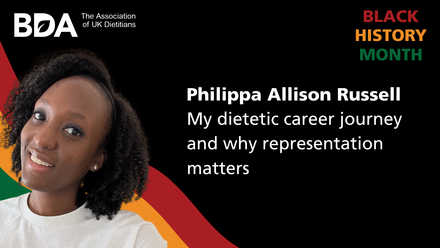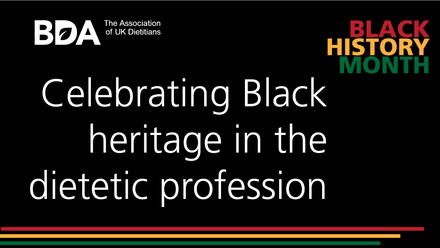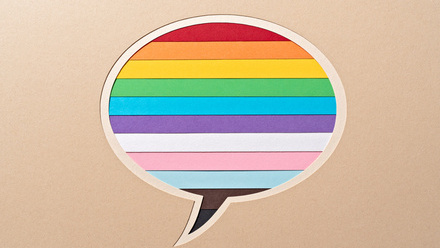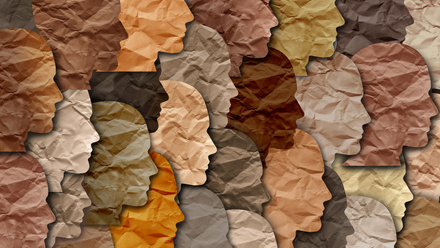A year on from the first BDA London Branch ‘Black Lives Matter in Dietetics’ event, we take this opportunity to reflect on the discussions and anecdotes from the panellists and audience from the webinar.
Speakers: Izzy Bandurek, Catherine Rabess, Hala El Shafie, Jasmine Carbon, Dr Jonathan Ashong-Lamptey, Kwayera Simpson and Tai Ibitoye.
Special thanks to Sophie Medlin (BDA London Chair) and the BDA London 2020 Committee for organising the event.
Black Lives Matter in Dietetics – a BDA London Branch event
“It is important to have these sometimes-uncomfortable conversions, to learn from each other.”
For many, the COVID-19 pandemic has only highlighted the pre-existing racial inequalities that Black and minority ethnic communities face every day. The difficulty and pain of these lived experiences were highlighted even further through the murder of George Floyd on 25 May 2020 in Minneapolis.
The shocking incident reflected the raw experiences of Black people in the UK, and as a result we saw a rise in the public profile of the Black Lives Matter movement in the UK and throughout the world. We saw and heard stories of discrimination, racism and racial prejudice experienced by people within the Black community in the UK across all media and social channels; however, as with most hot news topics, it seems to have fallen out of the public eye.
The British Dietetic Association (BDA) London Branch Committee hosted a live stream event on 24 September 2020, with a panel of Black dietitians and a workplace diversity and inclusion guest speaker. The panellists shared their experiences of working as registered dietitians in a professional field where the Black community is largely underrepresented.
The aim of the event was to empower, raise awareness, and encourage self-reflection, so that we can work together towards racial equality.
Black Lives Matter in … forming your assumptions about colleagues
“She said ‘Your afro doesn’t look professional.’”
Whether conscious or unconscious, our experiences shape our assumptions across our lives, including in the workplace. For Black dietitians and dietetic students, the effects of this can reverberate across their careers.
Catherine recalled a day she walked into the office with her hair styled in her natural afro, to be met by a fellow dietitian who pronounced “Your afro doesn’t look professional.” Being Black, and also a woman, Catherine reflected that it had taken a long time for her to embrace her natural hair.
But why would someone think an afro was unprofessional?
In this situation, Catherine challenged her colleague on the statement made; the dietitian had no satisfactory reply. The simple truth is that Catherine’s hairstyle sat within the uniform policy, and she has the right to wear her hair in a way that is comfortable to her.
However, not every Black dietitian feels able to challenge such biased statements. Tai, another panellist, shared her story from a placement: over a weekend, Tai had spent seven hours at the hair salon getting braids. On the following Monday, she was told by her supervisor, another dietitian, that she would have to change her hairstyle as it was considered unprofessional. Being a conscientious student and eager to pass her placement, Tai spent the evening undoing the weekend’s work.
Tai reflected that her hairstyle is an important part of Black culture. “A lot of Black students conform, but when you conform to identities, you lose a bit of yourself.”
The experiences of Black women dietitians and their hairstyles is just one illustration of a pattern of biases that the Black community face daily. As Tai put it, their dietetic careers are in the hands of their supervisors, colleagues, and managers. Have you ever had to change your appearance to be less like yourself?
The keynote speaker, Jasmine, spoke about her experiences of microaggressions in the workplace, from colleagues and clients alike.
Microaggressions can be defined as “brief and commonplace daily verbal, behavioural, or environmental indignities, whether intentional or unintentional, that communicate hostile, derogatory, or negative racial slights and insults toward persons of colour”.1
Microaggressions can be challenging to describe in terms of the actual event and in terms of impact. However, all the panellists noted that microaggressions accumulate into a significant burden. Jasmine speaks about her experiences of microaggressions.
'Ohh you’re not how I expected you to look. You’re very well spoken on the phone' and ‘Sorry, I thought you were one of the cleaners’ are a few examples of microaggressive comments I have had said to me. Often, it’s not what is said but what the comment is insinuating that causes the hurt.
“Telling a Black woman that her appearance does not match their stereotyped idea of a Black woman says that not only is she not ‘Black enough’ (in their opinion) but that others can define what it is to be Black.
“Preconditioned assumptions of Black people sculpt a perception often rooted in negative, wild characterisations and misrepresentations of who we are and, at best, reflect the extremes of a group filled with variety and layers. These are not standards that should be adopted to define us or measure us against.
“Before having made any introductions and wearing a Trust issued healthcare tunic (just like the other health care professionals in the room) I was singled out and assumed to be a domestic staff member. Half of my colleagues said nothing while the others thought it was funny. I corrected the patient, introduced myself and completed my consultation but couldn’t get past the way I was addressed differently from my peers;the only difference being the colour of my skin.
“Comments like the two I have mentioned are extremely difficult to rationalise which can make it even more difficult to speak up about it. They’re not overtly racist and I was not physically harmed but I still felt insulted and it makes me uncomfortable to reflect on those moments even today. For me, there was a fear that if I did raise it, nothing would be done, there would be no escalation or investigation, and nothing would be learned.
“I now feel more empowered to challenge the preconceptions and if I need to, will escalate it. I hope that with time more of us are able to do the same.”
Black Lives Matter in … forming your assumptions about clients
“Don’t make assumptions – ask questions.”
Jasmine asked the panellists to give some advice to dietitians in the audience regarding working with clients from minority, racial, and ethnic groups. The overwhelming advice was for dietitians, dietetic students, dietetic support workers, and anyone else engaging with clients to not make assumptions. As Hala simply put it, “Someone might prefer Italian cuisine!”
The process of asking open questions, listening to the answers, and allowing the client to educate you can help build rapport. Furthermore, the learning that takes place will facilitate the development of a better dietetic care plan, that is truly client-centred. When we do not do this, we leave the client with barriers.
Kwayera thoughtfully reflected that the learning process may well take more than one appointment, which gives the opportunity for dietitians to further research and understand the client and their cultural background. In his experience, this effort is hugely appreciated by the client. It is about being respectful and taking the time to understand.
In situations where you do not know the answer, or do not understand the foods, meals, and traditions your client is talking about, the panellists advised that you should be signposting to people and resources that do know.
There are many professional development opportunities for dietitians to improve their knowledge of cultural traditions in food, for example through cultural cooking classes. Professional development can be very straightforward; as Kwayera asked us, “When was the last time you went in a supermarket that wasn’t in the ‘big six’? Do you know what is being sold and on offer in other food retailers?”
Black Lives Matter in … the student experience
“A lot of Black students conform, but when you conform to identities, you lose a bit of yourself.”
As registered dietitians, we have all been through the student experience. The thrill of seeing your first client on your own, the constant feedback (both positive and constructive), the stress of balancing placements with uni work; it is a formative experience for us all.
However, for Black students, the experience also comes with the fear of discrimination, conscious and unconscious microaggressions from colleagues and clients, and sometimes overt racism.
Tai shared her experiences of racism during placement, speaking candidly about the emotional impact this had on her and how she cried every evening. She shared her experience with her placement tutor at university who, although supportive and empathetic, suggested that Tai might defer her studies for a year to remove herself from the situation.
Tai successfully passed her placement but relied heavily on her friends and family to endure it. When speaking with another Black student also on placement in the department, Tai realised the awful truth that her experience was not unique. A telling sign of the pervasive racism that exists in healthcare and across the UK is that neither Tai nor her friend felt able to speak out or confront the perpetrator.
All the panellists agreed that more support and training is needed for placement tutors, practice educators, and supervisors working in dietetics on how to manage disclosures of racism while students are on placement. Placement tutors at university are well placed to support students in navigating experiences of racism and, as Hala reflected, having a conversation in confidence is crucial and can be the difference in someone’s life, not just their career. However, the responsibility of supporting students and rooting out racism in dietetics lies firmly with the whole profession.
Catherine spoke about the hugely supportive mentoring relationship she had early on in her career. Catherine’s mentor was a similar background to her and was able to provide practical support from a place of shared understanding. Mentorship and allyship schemes, with support being made available within and outside the placement setting, may be a way forward. It is important that every instance of racism is called out and reported, as it is about everyone who is subjected to discrimination.
Black Lives Matter in … the dietetic curriculum
“There is the attitude of ‘we don’t see colour’, but we know that people do.”
Reflecting on the dietetic curriculum in the UK, the panellists agreed it is “very White”. The population of the UK is highly diverse, as the following data from the Office of National Statistics show:
- As at the 2011 Census, the most ethnically diverse region in England and Wales was London, where 40.2% of residents identified with either the Asian, Black, Mixed or Other ethnic group.
- Out of all regions, London had the smallest percentage of White British people, at 44.9%, and the North East had the highest percentage, at 93.6%.
- People from the White ethnic group were more likely to live in the South East than any other region, with 16.2% doing so; people from the Black, Asian, Mixed and Other ethnic groups were more likely to live in London than any other region, with 58.4%, 35.9%, 33.1% and 49.9% doing so respectively.
- 81.5% of the general population lived in an urban location, and 18.5% lived in a rural location – the ethnic groups most likely to live in an urban location were Pakistani (99.1%), Bangladeshi (98.7%), and Black African (98.2%).
- Newham in London was the local authority where people from the White ethnic group made up the lowest percentage of the population (at 29.0%); 8 out of the 10 most ethnically diverse local authorities were in London.2
The diversity reported above, and seen in our everyday practice, should be reflected in the dietetic curriculum, setting up students for a career in a diverse and multicultural society. The panellists, supported by the BDA London Branch Committee, call for any interested colleagues working in universities and with influence on the national dietetic curriculum to engage with minority, racial, and ethnic groups to build a curriculum equipped for the UK’s multicultural future.
To build students’ understanding and appreciation of cultural diversity, Catherine sets her students the task of conducting a public health profile of the local borough. She has found this task has been hugely beneficial for the students and highly recommends all dietitians, students, and dietetic support workers to better understand the cultures of the population they are serving. Such activities could be built into all student placements, to great effect.
Black Lives Matter in … the dietetic profession
“Trigger warning – this is going to be uncomfortable.”
Dr Jonathan Ashong-Lamptey – who has a PhD from the London School of Economics on the lived experiences of minority racial and ethnic individuals in the workplace – spoke about how racism is a system, which confers privilege on specific groups of people. Many people and groups can be complicit in the sustaining this system, both consciously and unconsciously. Jonathan told the audience upfront that this next part would be uncomfortable: how professions, by their nature, discriminate.
Ultimately, professions are a state-sanctioned monopoly over an area of knowledge and practice, of which dietetics is an example. Society condones this system of operation, if it is perceived that anyone can join the profession (upon meeting the agreed standards). However, when access to a given profession is not open to all equally, then the sociological contract is broken.
It is crucial in any profession and walk of life to have representation. As Hala put it “You cannot be what you can’t see.” Therefore, the dietetic profession has a responsibility to encourage and support minority, racial, and ethnic groups to join it – and to support their progression throughout their careers.
Jonathan summarised the approach we should be cultivating consistently:
- Socialising inclusive ideas – engage with difference and other aspects of identity
- Support – typically, a mentor is someone who chooses you, which is a challenge if you are underrepresented; this can be overcome through dedicated development networks and subsets of social networks
- Systems – progression is often about informal relationships and structures, and these need to be more inclusive
Actioning the above approach will be an iterative process and begins with engagement from dietitians across all levels and groups of the profession.
The Black Lives Matter in Dietetics Charter
“A lot of people posted black squares … but a couple of weeks later, there was silence.”
The panellists were united in their call for non-performative engagement and real action. In one step to maintain momentum and engender change across the dietetic profession, the BDA London Branch Committee, in collaboration with the panellists, has developed the Black Lives Matter in Dietetics Charter.
The Charter is intended to guide dietitians, dietetic students, dietetic support workers, dietetic departments, and practice educators on actions they can take to:
- Be proactively anti-racist
- Support minority, racial, and ethnic groups across the dietetic profession
- Identify and address conscious and unconscious biases in themselves
- Challenge and support colleagues, peers, students, and others with whom they work who express conscious or unconscious racial bias
- Ensure that the Black Lives Matter agenda remains an active part of conversations within the dietetic community
- Better understand the populations which they serve, with respect to cultural, social, and health-related outcomes
Actions for all
- Watch the video from the ‘Black Lives Matter in Dietetics’ event (if you have not already) and ‘Black Lives Matter- 1 Year On’ and reflect on the content and themes, using the critical reflection tool developed by the BDA London Branch
- Read the following book, as recommended by the Black Lives Matter in Dietetics panellists:
- Multicultural Handbook of Food and Dietetics by Aruna Thacker and Arlene Barton
- Undertake a public health profile for the locality in which you work, to better understand the populations which you are serving
Actions for students
- Use your End of Week review meetings to raise any concerns you may have
- It may be optional for you to have a mentor during your placement time. Your mentor should be a dietitian or a dietetic assistant who is not directly involved in your placement assessment
- Find out what support services are available in your university
Actions for dietitians and dietetic support workers
- Find out who your BDA Trade Union representatives are. If your team doesn’t have a rep, why not volunteer?
Actions for BDA Branches and Specialist Groups
- Consider the following:
- How can your committee be made to be more inclusive?
- What can you do to increase engagement from dietitians of different ethnicities?
- Are your guest speakers diverse?
Actions for clinical and public health departments
- Make sure your public information packs and posters are representative of the people you are trying to inform
- Make publications available in more languages
- Seek volunteers for studies from a wider population pool to increase representation and the ability for the study’s findings to be generalised to larger populations
Actions for university departments
- Invite guest lectures to cover topics around culture
- Include equality, diversity and inclusion in the syllabus
- Create a system that allows students to feel comfortable in speaking-up about any difficulties they may be having during their placement. Especially difficulties in them being able to express their identity
Appendix: Critical reflection tool
Developed for use alongside the ‘Black Lives Matter in Dietetics’ event (28 September 2020, hosted by the British Dietetic Association London Branch).
|
Watch the recording of the ‘Black Lives Matter in Dietetics’ event, then answer the following eight questions. |
|
1. Describe the event. To you, what were the main themes of discussion in the event? |
|
|
|
2. What did you learn that was new to you? What did you already know? |
|
|
|
3. Did any of the discussions make you feel uncomfortable? Why do you think that is? |
|
|
|
4. What experiences of discrimination in the workplace do you have? (Think about comments made to or about you, comments you have made or beliefs you hold about others, comments colleagues have made about other colleagues, the diversity of your team, examples of microaggressions) |
|
|
|
5. From your experience, what do you think are the impacts of racism and discrimination on: dietetic clients; dietetic departments; population health outcomes; and your practice? |
|
|
|
6. What do diversity, equity, and inclusion mean to you? |
|
|
|
7. Take the Implicit Bias Test – Race (hosted by Project Implicit at Harvard): https://implicit.harvard.edu/implicit/user/agg/blindspot/indexrk.htm What result did you get? What are your thoughts and feelings on your result? What are the advantages and limitations of ‘tests’ such as this? |
|
|
|
8. What actions will you take to address and eliminate racism in the workplace? And in the wider dietetic profession? |
|
|
Sources
- Sue DW (2010). Microaggressions in Everyday Life: Race, Gender, and Sexual Orientation. Sue, D. W., Capodilupo, C. M., Torino, G. C., Bucceri, J. M., Holder, A., Nadal, K. L., & Esquilin, M. (2007). Racial microaggressions in everyday life: Implications for clinical practice. American Psychologist, 62(4), 271. doi:10.1037/0003-066X.62.4.271
- www.ethnicity-facts-figures.service.gov.uk/uk-population-by-ethnicity/national-and-regional-populations/regional-ethnic-diversity/latest (last updated 7 August 2020).





